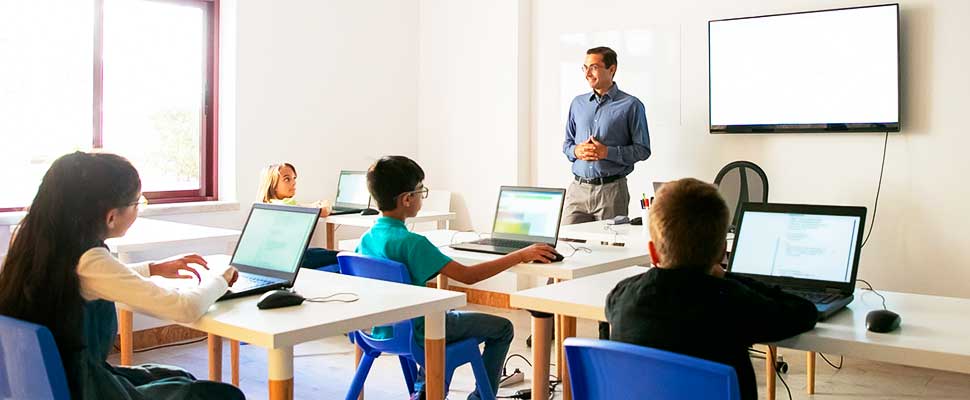The Pros and Cons of Attending a Private School in the US
Read on to discover some of the advantages and disadvantages of attending a private school to help you make the best choice.

Phil Collins
Escucha este artículo
Many families find it challenging to decide whether to take their children to a private or public school. Both options have their ups and downs. It is important to make careful considerations before settling on a school for your child. Read on to discover some of the advantages and disadvantages of attending a private school to help you make the best choice.
The Pros of Attending a Private School in America
There are many advantages to enrolling your child in one of America's private schools. These include:
Academic Excellence and Favorable Test Scores
Students attending private schools have a higher average score on the SAT, ACT, and AP exams than those who attend public schools. For instance, a 2016 report indicated that private schools registered up to 100 points above the mean, while public schools registered only up to 9 points above the national mean. It is a clear indication that many students attending private schools are getting an excellent education.
Smaller Classroom Size
A private school might offer a more personalized educational experience where children are taught in small groups. Due to a favorable teacher-student ratio, teachers may provide extra support for students, including helping them with behavioral or emotional issues. In addition, learners with special needs like dyslexia have a better chance of up-close monitoring in a private school.
Access to Advanced Classes
Most of these schools provide access to advanced classes that will help students with their studies in the future. It's also possible for students to take special courses on weekends and in the summer. Examples include dedicated gifted classes and the International Baccalaureate (IB). One requirement of the IB program is writing a 4000-word essay. Students can pay for essay samples and write better papers with the help of an essay writing service provider and improve their prospects.
Better Learning Resources and Equipment
The private schools in the US also give their students access to better learning resources and equipment. They have lab facilities, libraries with internet connectivity, computers for every individual student, and other gadgets that help them learn about technology. Access to these resources gives private students an academic edge as their learning experience is practical.
Strict Discipline Levels
Private schools in the US also have strict discipline levels. The students are not allowed to talk or leave class without permission, and they're expected to follow a dress code. These institutions are also strict on class attendance and do not tolerate bad behavior like bullying. High discipline levels provide a conducive learning environment for all students.
Emphasis on Parental Involvement
The parents of private school students have direct involvement in their child's education. They take an active role and visit the institution regularly to check on the progress, ensuring that their kids get the best opportunities for success. Furthermore, when there is an important event like a fundraiser, parents pull efforts to contribute and help the schools attain their development goals. As a result, private schools enjoy a community feel due to the commitment of parents and other members of the neighborhood.
Read also: 6 best online games that can make kids fall in love with mathematics
The Cons of Attending a Private School in America
While private schools offer an excellent education to their learners, here are some cons to consider:
They Are Expensive
Private schools in the US are pretty expensive. They can cost up to $35,000 per year. There are many reasons why private schools cost so much. Some of them include the teachers, building costs, and equipment. One way to reduce these costs is by finding a scholarship or taking advantage of grants for college students. Unfortunately, families unable to find loans or scholarships to cover their child's education in a private institution must bear with public schooling.
Teachers May Lack State Certification
Unlike public schools, private institutions of learning do not require their teachers to be state-certified. While this makes it possible for private schools to spend less on salaries and fill up teaching vacancies, uncertified teachers may fall short when it comes to expected learning deliverables. Also, such teachers may be less motivated than their certified counterparts, who earn higher salaries doing the same job.
High Academic Pressure
Most private schools are academically competitive, and often, they have high academic pressure. They are constantly under pressure to get the highest scores on standardized tests and send their students to prestigious universities. This is a major disadvantage for students who find themselves in the position of falling behind their peers or struggling with particular subject areas. In addition, the pressure to earn higher grades may make it harder for students with learning difficulties to excel.
Lack of Diversity and Inclusion
Often, private schools are associated with a lack of diversity and inclusion. There is usually an expectation that students will afford the tuition and other fees required for attending these institutions. The result is less socioeconomic diversity than state or public schools, which have more diverse populations because they do not require payment at admission time. This may pose a problem later in life when these students have to thrive in a diverse community.
Limited Extra-Curricular Activities
Private schools are often criticized for limiting after-school activities and extra-curricular programs that students can take part in. This is because private school staff has to prioritize their time, resources, and energy on academics instead of extracurriculars. Sports-oriented learners may find this frustrating, especially when they have a strong desire to develop their athletic abilities and excel in sporting activities.
Conclusion
When considering a private school for your child, it's crucial to think about their needs. Private schools have an edge in some areas like academics or personalization but may not be as strong in other areas such as financial aid and diversity of students. The choice is yours as the pros and cons will vary from person to person depending on their values. Make an informed decision with this information by weighing the options that fit best for your family!





